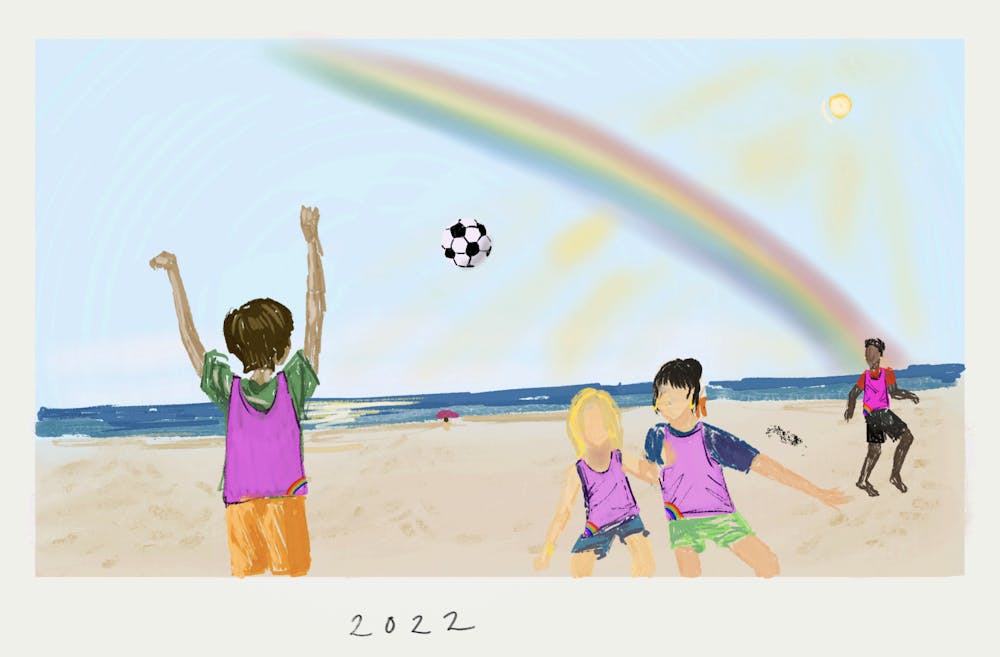When Caroline Sassan ’24 found out that the University was not offering its typical intramural soccer programming this fall, she began to look for alternate ways to still get on the field. Looking for “a pickup-type situation,” she came across an informal, queer soccer group led and participated in by queer students on College Hill.
For Sassan, who also runs for the University’s track team, the club offers a low pressure space where she can enjoy the sport with a community of her peers. “It’s been super fun and low stakes,” she explained.
Queer Soccer, which was founded at the start of this semester, meets every Friday at 5 p.m. in Gano Street Park. More than 40 students now regularly attend the practices.
Founded by Luci Jones ’23, Queer Soccer aims to create a space where queer students can meet one another and work out in an informal setting. Jones attributed the idea for the club to her participation in queer pickup soccer games in Brooklyn this summer, an environment she said provided “a really incredible community.”
Jones emphasized that the focus on community at her summer pickup games helped reduce barriers to entry and ensure everyone had fun. “Everyone just came to play,” Jones said. The matches weren’t about proving any skill or lack thereof, but just “enjoying the sport.”
Kaitlin Goldin ’23, who helped Jones organize the team on College Hill, also noted that Queer Soccer is not about “doing it for the competition.” Instead, “we’re doing it to have a really informal space to play and workout and just be with other queer people,” Goldin explained.
“I’ve personally had a really fraught relationship with sports throughout my life,” she said. Having played soccer when she was younger, Goldin eventually stopped because it “felt too competitive and anxiety-inducing.”
“The people on (those) teams were not the supportive and loving people I needed to surround myself with,” Goldin said. “My hope is that people are able to work out in a fun way in community.”
While Jones expressed that it would be nice to have more frequent practices, the accessibility of meeting once a week is part of what makes the team “so great.” She hopes to “cultivate a really inclusive team atmosphere” while ensuring practices are not “such a formal activity.”
Jones also appreciates that the team is centered around playing soccer, not just its members’ identities.
“I think because it’s also (about) soccer, that made it easier for me to feel comfortable going,” Sassan said. Being part of a “queer-designated group … is sort of a new thing for me.”
“There’s a lot of spaces on campus that are very queer,” Goldin said, citing theater and comedy groups as examples. “What feels special to me about this is … it’s a great opportunity to meet other queer people that you wouldn’t otherwise meet.”
The club continues to grow each week through word of mouth despite minimal advertisement from the organizers, Jones said. The team initially started with a group chat of about 20 people but has since grown to 87 members, with 30 to 40 of them coming to practice each week.
“The first time I organized (a practice), I was scared no one was going to show up,” Jones said. “But in a way I’m also not surprised (about the team’s growth),” she added, recalling the widespread attendance to the queer soccer group she joined over the summer.
“I’d love to see even more new faces showing up,” Jones said. “It’s nice seeing someone come one week and then show up another week and you know they’ve caught the bug.”
Goldin also would like to see more people at the practices, but noted that she was happy with the group in its current structure. “I think the fun thing about it is that there are no future goals,” she said. “There’s not like a mission, we’re just hanging out.”
Sassan said she would like to see the club one day evolve into an intramural league. But, for now, the informal setting “is also really cool,” she noted.
Jones encouraged queer community members interested in soccer to join a practice and follow the club’s Instagram page, @brown_queersoc.
“I also want people to know that if they're not sure about their identity,” she added, “they’re still welcome.”





